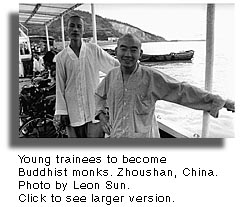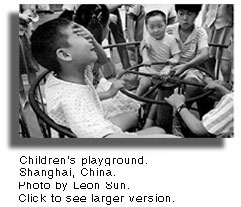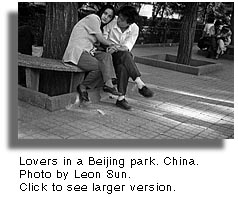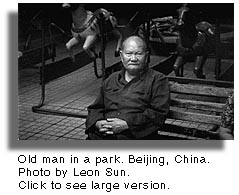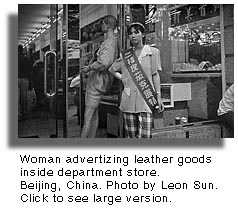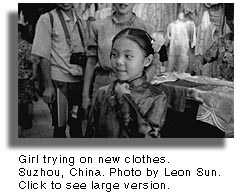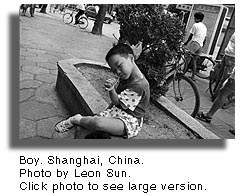|
My family left Shanghai for Hong Kong when I was seven. ...
Two Days and A Lifetime in Shanghai
September 1, 1994 We woke up early the next morning. Pulling back the curtains I saw that our room was up high. The sun was just rising through the haze. I immediately noticed the new skyline. The taller buildings, like early risers, were the first to catch the sun's early rays, showing off their newness with an orange glow, while allowing the older, lower buildings to sleep a little longer under their hazy shade. Looking past the older, decaying rooftops and the streets far below, I saw that people were already out and about - on foot, on bicycles and a lot more cars than I remembered from before. I woke Karen up so we could go for a walk before I had to do my delegation duties. In a few minutes we were down the elevator, through the new lobby that I didn't like, and out onto the street. We were greeted once again by the rush of hot, humid air, and the constant, persistent hum of human activity. On the nearby street corner were a group of old people doing morning Tai chi exercises. An old man in baggy grey shorts and a tank top undershirt was stretching his leg up against a lamp post - certainly more limber than I could ever hope to be at his age, or even now, for that matter. I take a photograph of him and move on to cross the bridge. The sun is up higher now and even more people are on the street. Tired, dirty old buses roll by packed with people going to work, their engines growling in complaint. On the bridge, a few citizens, besides us tourists, stopped to admire their own city, contemplating the changing skyline that symbolized the changes in their own lives. I took their picture, and one of Karen at the exact same spot where I took one ten years ago. We made our way to the Bund. In a city where space is a premium, it was a luxury to stroll down the wide expansive sidewalk and boulevard of the Bund. It was actually a newly constructed promenade, elevated from auto traffic, and was very pleasant. The Bund is the essence of Shanghai. It is where China meets the West. The stately old buildings, built by Europeans at the height of their power and arrogance, were covered now in soot, grime and old memories. Their decrepit condition belied the promises of the Chinese revolution. Yet, in spite of this undignified treatment by history, the Bund still displays a grandeur and dignity that recalled the world's other grand old cities. Like Venice and Budapest, sitting alongside great rivers and waterways, they have witnessed the flow of histories both sordid and heroic. Shanghai has certainly seen its share. I wondered, against this overwhelming backdrop, if this great city remembers me, when I last walked down the Bund forty years ago, holding onto my father's hand and feeling the same excitement as I did now. In 1984 Karen and I visited our old home, a European style apartment building in the old French Concession. I remember the excitement as I approached the old neighborhood and began to point out old landmarks to Karen. We walked along a cement wall along which I had run my hand one winter, scooping up the freshly fallen snow. When we rounded the corner and came upon our old apartment, the first thing that struck me was how small it looked. In my memory it was much bigger. Like the other old buildings in Shanghai, it had also become decrepit. Structurally, nothing had changed. I was able to pick out our unit right away because of the old wooden windows that my father had installed on the veranda to effectively gain an extra room. I took Karen up the stairs, all the way to the front door of our unit, but I stopped short of knocking on it. The inside was way too personal and I wanted to preserve my memory of it. Walking around to the back to where a grassy area used to be, to where I played with my sisters and neighborhood kids, I was dismayed to see that it had been built over with shacks used for housing. I took some pictures and left. I had accomplished one of my main objectives of that trip - to find my old home, to reconnect. And here we were again in 1995. In the nearly forty years since my family left Shanghai, the last ten had seen the most changes of all. Walking along the banks of the timeless Huangpu River I was filled with the sense that we were seeing yet another chapter of history being written. The morning light revealed a Shanghai waking to the rhythm of a new-found energy and sense of purpose Turning into Nanjing Road, famous for its shops, the volume of energy got turned up a couple of notches. Whereas on the Bund, pedestrians were safely separated from auto traffic, here it felt like we were in a middle of a giant pot of stew. The sidewalks bubbled with people. And the people spilled out onto the roadway, doing a reluctant dance with bicycles and cars. New skyscrapers, looking like something out of a Japanese comic book, thrust their way shamelessly into the sky, in total disregard for the decaying old buildings from another era. All the shops appeared to have new storefronts - fashion boutiques with Italian sounding names and blond haired mannequins, electronics stores beckoning passers-by with their clean, air-conditioned show rooms, offering them a respite from the heat, even if they weren't interested in buying. Little remains of the past except a few isolated pockets of activity. Across the street I saw a group of elderly men and women practicing Tai chi amidst the hubbub of a bus stop and construction site. Out of the corner of my eye I caught a glimpse of an elderly man and a young woman, perhaps his daughter, practicing ballroom dancing in the darkened archway of an old building. It was somewhat reassuring to see a simpler way of life persisting through the changes, though I also knew that I was probably seeing the last of it. I couldn't help but recall what the old Shanghai streets looked like, and a way of life that only a few people seem to remember. My mother used to come down here quite often, taking me along with her. Holding on to her hand I was free to look at whatever I wanted without falling or getting lost. There were so much to see in every direction: big red banners hanging across buildings with political slogans painted in white characters, busloads of Russian sailors being hustled through the streets on "Friendship" tours, waving to a somewhat bewildered crowd on the street. Mostly only children like myself waved back. On any busy corner there might have been people arguing with each other, sometimes attracting a large audience who often took sides in the conflict. I had a special fondness for the green and cream colored electric street cars that were noticeably missing from the present day streets of Shanghai. They were always packed to the rivets with people, motors moaning and wheels grinding as they made their way along the tracks, their drivers furiously ringing the bells to clear the people out of their paths. At home I would play at being a street car driver, making a street car out of the furniture and an odd assortment of boxes. The window displays in those days were nothing like what we saw now. Besides being less glitzy they were often of things you couldn't actually buy. Many of the businesses had been nationalized or expropriated by the People's Government, and the goods had long since stopped coming to the stores. Some stores, however, did have a few goods available for sale. I remember, in particular, a toy store that had these brightly colored wooden trucks, tractors and cranes. There was a tractor with an excavator in front that looked just like the ones I had seen in Government movies, showing how the new China was now opening up land and building industries, like steel, shipping and railroads. I had longed for it, as only a child could. At about that time I had gotten sick, and as my mother sang me to sleep, she promised to get me one when I got well. I did get well, but I never got the tractor-excavator. My mother loved to go out - to shop, eat and to stop and chat with folks. And she had her favorite places. I loved the Wing On and Sincere Department Stores, with their toy departments, and all the beautiful clothes on life-like manikins. I loved most going to Kissling's German bakery, where they made the most heavenly chestnut cream pie. As soon as we walked through the door, we were embraced by the sweet, warm aroma of wonderful things being made for eating. Even the noises at Kissling's were different - the clink of silverware and glasses, as opposed to the click-clack of chopsticks and the loud voice noise of Chinese restaurants. We would go to many of the same stores over and over. My mother knew practically all the tailors and jewelry store owners on Nanjing Road or old Joffe Road. She would sit for hours chatting with them, which, of course, bored me to death. To escape I would park myself by the doorway and watch life in the street go by. Once a small parade came by, accompanied by drums and gongs, led by very enthusiastic, ruddy-cheeked Young Pioneers. The parade looked just like the countless ones that passed by our dining room window. This one was to celebrate the patriotism of all the small business owners on the block who had turned over their stores to the People. The parade would stop at each store, and, as the drumming reached a crescendo, a man would wheat paste strips of red papers on the store window. The papers would have congratulatory slogans written on them. The owners of the store, at that time, would come out and thank the people and shake hands and bow and smile a lot, and sometimes even make a short speech. After the parade had made its stop at the jewelry store that we were in, the owner went back to talking to my mother. "Hai...," he sighed, as the noise of the parade trailed off down the street. "Outside, my face is all smiles, but my tears - I have to force back inside, and swallow them like bitter pills." How ironic, walking down Nanjing Road now, to see private businesses come back in such profusion, and with seemingly no memory at all. I wondered if any of those old storekeepers or their descendants have a place now on Nanjing Road. I was awakened from my reminiscence by the clock. It was time to head back to the hotel, to join the rest of the delegation and meet our hosts for breakfast - a good old Shanghai styled feast, no doubt. Later that morning we left by boat for our sister city Zhoushan. As Shanghai receded from sight I looked forward to returning in a week, after all my official duties, to once again walk the streets of the city of my birth - this time with my camera. Indeed, I took my camera with me all over Zhoushan, as well as Beijing and Hangzhou and Suzhou and all the places we passed through on our tour. I knew that the answers to all my questions about where China was headed could only be found in the faces of everyday people, and that I - now that I feel so American - will also find my Chinese self reflected in them. Also see: |
||||||||||||||
| Published in In Motion Magazine June 29, 1997. |
||||||||||||||
If you have any thoughts on this or would like to contribute to an ongoing discussion in the  What is New? || Affirmative Action || Art Changes || Autonomy: Chiapas - California || Community Images || Education Rights || E-mail, Opinions and Discussion || En español || Essays from Ireland || Global Eyes || Healthcare || Human Rights/Civil Rights || Piri Thomas || Photo of the Week || QA: Interviews || Region || Rural America || Search || Donate || To be notified of new articles || Survey || In Motion Magazine's Store || In Motion Magazine Staff || In Unity Book of Photos || Links Around The World NPC Productions Copyright © 1995-2020 NPC Productions as a compilation. All Rights Reserved. |


